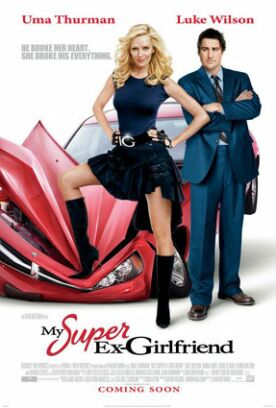My Super Ex-Girlfriend
Like most of what passes for satire in Hollywood, Ivan Reitman’s My Super Ex-Girlfriend, is too self-referential. The movie business’s satire of anything outside the movie business (see Primary Colors, Wag the Dog or Mr Reitman’s own Dave) is inept, while its satire of itself (see The Player) invariably stumbles over the fact that it is too much in love with itself to stick the knife in. Yet Mr Reitman’s film also has its points. It begins with what amounts to an announcement that it is in “Seinfeld” territory as its hero, Matt Saunders (Luke Wilson) and his sidekick, Vaughn (Rainn Wilson), argue about what super-power they would choose if they could have just one. Like similar hypothetical discussions between Jerry and George Costanza, this tells us that they recognize the essential silliness and childishness of the whole super-hero concept, but that they are content to remain children in this respect (as in others) and, in fact, are rather proud of themselves for it. They would think themselves pretentious to express genuine skepticism.
Matt, on a dare from Vaughn, approaches a mousy-looking Uma Thurman — or as mousy-looking as it’s possible for Uma Thurman to look — in a subway car and asks her out. She shoots him down, but just then a mugger grabs her purse and sprints out of the subway with Matt in hot pursuit. Matt gets the purse back while at the same time showing us that he is far from being a hero, even of the non-super kind. Yet Miss Thurman, going under the name of Jenny Johnson, tells him that she is helping people all the time and that this is the first time anyone has helped her. “You’re my hero,” she tells him.
Of course, it’s a joke, like everything else in the movie. She happens to be “G-girl,” a superhero (heroine?) with, apparently, pretty much unlimited powers, including the power to give Matt the kind of experience in bed — the coy synecdoche for which is that the bed smashes the bedroom wall and breaks — that keeps him coming back for more even though it swiftly becomes apparent that she is also nuts. Well, neurotic, manipulative, insecure and paranoid — not qualities usually associated with superheroes.
And here we must touch upon a delicate subject that remains largely subtextual — or subsexual — in the movie. It is that a female superhero is really a contradiction in terms, though the ruling unisex ideology in Hollywood doesn’t allow it to say so explicitly. All the male superheroes are wish-fulfilment fantasies. Boys, particularly if they are nerdy and timid, like to imagine themselves in possession of powers that allow them to man-handle the world and make them invulnerable to those they fear. With those powers there traditionally come modesty, chivalry and a gift for understatement. Girls are not immune to such temptations, but their fantasies don’t usually take the same form. They don’t dream of knocking missiles out of the sky with brute force like Superman but of magically manipulating husbands or boyfriends with a twitch of the nose, like Samantha Stevens on “Bewitched.”
G-girl — we are never told what the “G” stands for, though both “Girl” and “Goddess” are suggested — is the physical, Superman sort of hero because she is not a positive female fantasy nearly so much as she is a negative male fantasy. She’s the ex-girlfriend from hell who doesn’t boil bunnies in a sneakily female sort of way but instead hurls giant, man-eating sharks through your bedroom window. In other words, she is not really a superhero but a super anti-hero, not the power-fantasy of the fearful but the ultimate fear itself, not a dream of safety but a nightmare of helplessness in the arms of a capricious killer with the world’s worst case of PMS.
The film is a comedy, so it’s pretty clear that our Matt isn’t going to be devoured by the shark. He’s bound to be all right and make, we trust, the smooth transition from psycho-girl to the unthreatening work-pal, Hannah (Anna Faris), who we see from the beginning is his destiny. But Mr Reitman’s film, written by Don Payne, has a final surprise in store for us. I hope it won’t be considered a spoiler if I give away this much: the fear of the super ex-girlfriend is not neatly disposed of like a super-villain dropped into a volcano — or even stranded on a desert island like Kevin Spacey’s Lex Luthor in the recent Superman Returns. She’s still around and still scary, though in a different way — domesticated, as we might say, just as the film’s own super-villain, played by Eddie Izzard, is.
The casting says it all. Mr Izzard’s “Professor Bedlam” — who’s afraid of a professor, even if he’s not played by a guy who’s known for dressing like a woman? — is obviously one of the feeblest super-villains on record. But he does do well at standing for the sexual ambiguity from which Matt finds no miraculous rescue in the end. At one point, when things are still pretty good between him and Jenny, and just after he learns her secret identity, she takes him up for what he describes as “a whole new take on the Mile High Club.” He says to her on this occasion, “I’m feeling just a little bit emasculated with you carrying me around like a toy poodle — but don’t let go.” That, high in the night-time sky above Manhattan, is also where the film comes down. G-girl, both Girl and Goddess, is not going to allay our fears of emasculation anytime soon, so we’d better get used to living with her — and her capacity for capricious destruction — hanging around.
Discover more from James Bowman
Subscribe to get the latest posts to your email.






